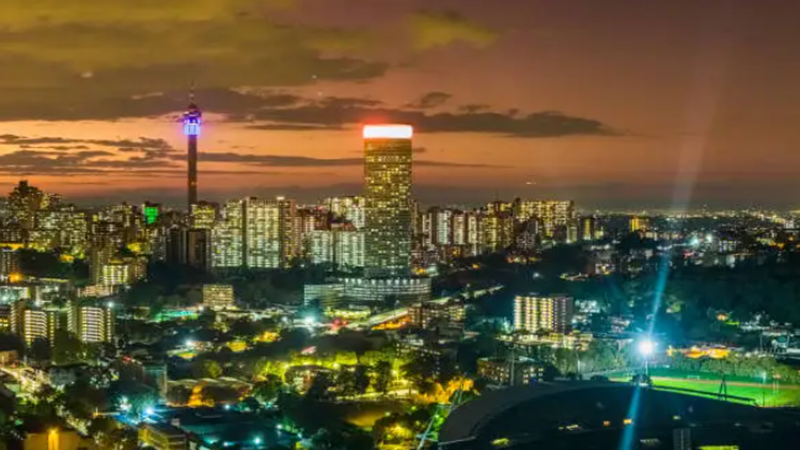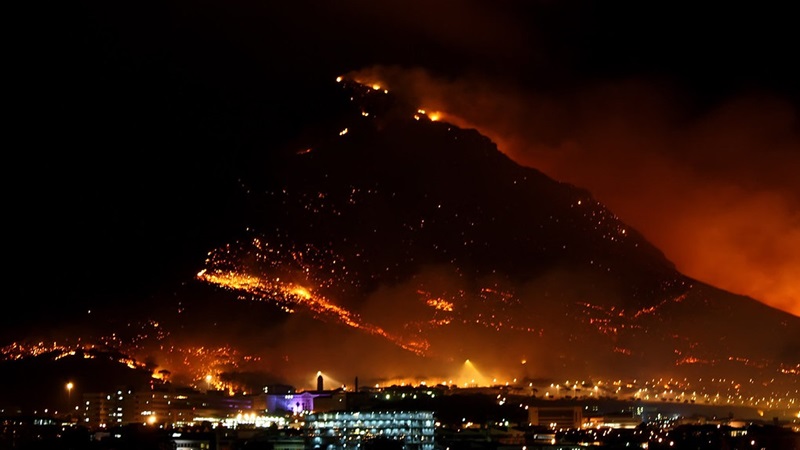Rooibos is more than tea. It is a legacy. It is a livelihood. In the Cederberg Mountains of semi-arid Western Cape, it's also a battleground for the climate. As the world heats up, this distinctively South African commodity grown only in the Cederberg area grows increasingly difficult to cultivate.
Imagine a climate change reality based on Murphy’s general law that anything that could go wrong will go wrong, and climate crises spiraled even further. What if dystopian science fiction is not just fiction, but a glimpse into a possible future? Picture a South Africa where Cape Town’s “Day-Zero” drought never ended, spreading across the country and turning water scarcity into the norm.
South African food is packed with rich flavours, made with vibrant colours and captivating aromas. As citizens of our multicultural country, we do not eat just to sustain ourselves but we indulge in the tastes of culture. The Bunny Chow, 7 colours, potjiekos, arguably the national favourite the shisanyama/braai.
Indonesia's large archipelago is home to the second highest marine biodiversity in the world. Still, beneath the surface a developing crisis threatening not only the livelihoods of coastal towns but also the very resilience of these waters to temperature variation lies buried.
The majority of Planet Earth is covered by oceans. Vast expanses of water that contain an ancient and delicately balanced ecosystem. Although rainforests are often described as the lungs of the planet, oceans absorb more carbon from our atmosphere, generate more oxygen, and provide a home to millions of marine animals, plants, and microscopic life. These systems, which are vital for the planet's future, are incredibly sensitive and are under increasing threat from global temperature increases as part of the climate crisis.
The Earth's climate is changing at an unprecedented rate, leading to a rise in the frequency and intensity of extreme weather events. From devastating hurricanes and rampant wildfires to catastrophic floods, these events inflict significant damage on infrastructure, disrupt economic activities, and threaten human lives. Beyond the immediate humanitarian crisis, extreme weather events carry a substantial economic cost, impacting governments, businesses, and individuals in profound ways.
Assessing the Human, Economic, and Ecological Impacts of Wildfires in the City of Cape Town (2022-2025).
Special Report Written By Bhekisisa Mncube
This article focuses on the various impacts of wildfires on the human population, economy, and ecology of the Western Cape, particularly the City of Cape Town. It examines the measures to mitigate this escalating climate change crisis of Trumpian proportions.
The call for equal gender representation is not new, nor are the solutions proposed. However, the urgency of addressing gender inequality has intensified as the world grapples with rising temperatures and the escalating costs of climate change.
As we continuously battle with the severe effects of deforestation, such as unpredictable rains, heat waves, floods and many more in different parts of the world, what is actually happening on the ground?
One can agree that climate change brought about a myriad of issues, particularly among small-scale fishers, one of the marginalised and vulnerable groups in South Africa and globally.
Dada Morero, the Executive Mayor of the City of Johannesburg, proposed a ground-breaking plan to plant 200 000 trees at the 2nd African Forum on Urban Forests, held in Johannesburg from March 18–21, 2025; with the goal of improving urban greening and fostering healthier communities.
Children are the least responsible for climate change yet will bear the greatest burden of its impacts. The United Nations Children’s Fund (UNICEF) already estimates that in recent years, the approximately 20,000 children a day worldwide have been displaced by floods and storms exacerbated by climate change.













 English
English العربية
العربية Български
Български 简体中文
简体中文 繁體中文
繁體中文 Hrvatski
Hrvatski Čeština
Čeština Dansk
Dansk Nederlands
Nederlands Suomi
Suomi Français
Français Deutsch
Deutsch Ελληνικά
Ελληνικά हिन्दी
हिन्दी Italiano
Italiano 日本語
日本語 한국어
한국어 Norsk bokmål
Norsk bokmål Polski
Polski Português
Português Română
Română Русский
Русский Español
Español Svenska
Svenska Català
Català Filipino
Filipino עִבְרִית
עִבְרִית Bahasa Indonesia
Bahasa Indonesia Latviešu valoda
Latviešu valoda Lietuvių kalba
Lietuvių kalba Српски језик
Српски језик Slovenčina
Slovenčina Slovenščina
Slovenščina Українська
Українська Tiếng Việt
Tiếng Việt Shqip
Shqip Eesti
Eesti Galego
Galego Magyar
Magyar Maltese
Maltese ไทย
ไทย Türkçe
Türkçe فارسی
فارسی Afrikaans
Afrikaans Bahasa Melayu
Bahasa Melayu Kiswahili
Kiswahili Gaeilge
Gaeilge Cymraeg
Cymraeg Беларуская мова
Беларуская мова Íslenska
Íslenska Македонски јазик
Македонски јазик יידיש
יידיש Հայերեն
Հայերեն Azərbaycan dili
Azərbaycan dili Euskara
Euskara ქართული
ქართული Kreyol ayisyen
Kreyol ayisyen اردو
اردو বাংলা
বাংলা Bosanski
Bosanski Cebuano
Cebuano Esperanto
Esperanto ગુજરાતી
ગુજરાતી Harshen Hausa
Harshen Hausa Hmong
Hmong Igbo
Igbo Basa Jawa
Basa Jawa ಕನ್ನಡ
ಕನ್ನಡ ភាសាខ្មែរ
ភាសាខ្មែរ ພາສາລາວ
ພາສາລາວ Latin
Latin Te Reo Māori
Te Reo Māori मराठी
मराठी Монгол
Монгол नेपाली
नेपाली ਪੰਜਾਬੀ
ਪੰਜਾਬੀ Afsoomaali
Afsoomaali தமிழ்
தமிழ் తెలుగు
తెలుగు Yorùbá
Yorùbá Zulu
Zulu ဗမာစာ
ဗမာစာ Chichewa
Chichewa Қазақ тілі
Қазақ тілі Malagasy
Malagasy മലയാളം
മലയാളം සිංහල
සිංහල Sesotho
Sesotho Basa Sunda
Basa Sunda Тоҷикӣ
Тоҷикӣ O‘zbekcha
O‘zbekcha አማርኛ
አማርኛ Corsu
Corsu Ōlelo Hawaiʻi
Ōlelo Hawaiʻi كوردی
كوردی Кыргызча
Кыргызча Lëtzebuergesch
Lëtzebuergesch پښتو
پښتو Samoan
Samoan Gàidhlig
Gàidhlig Shona
Shona سنڌي
سنڌي Frysk
Frysk isiXhosa
isiXhosa